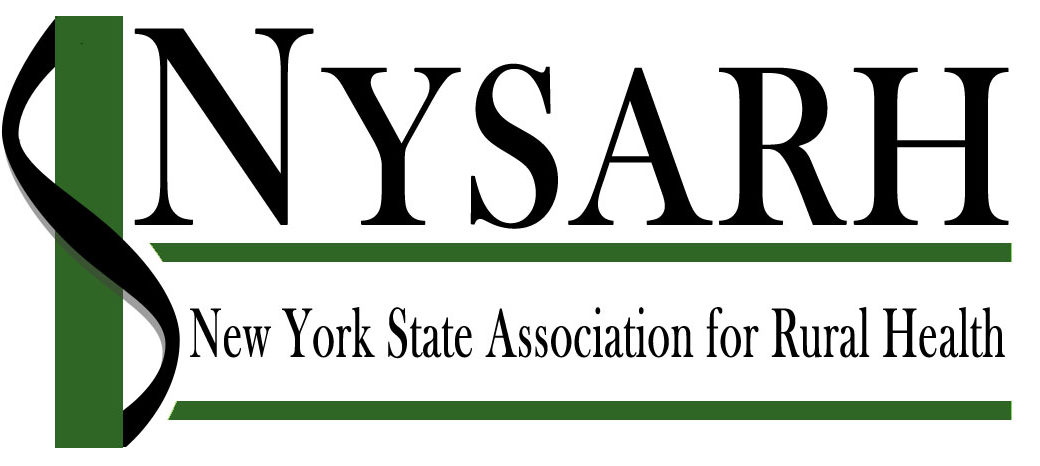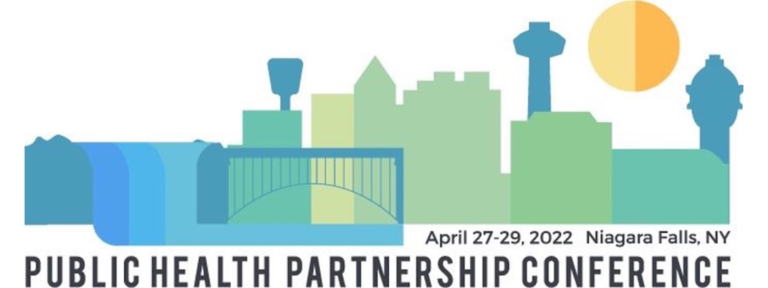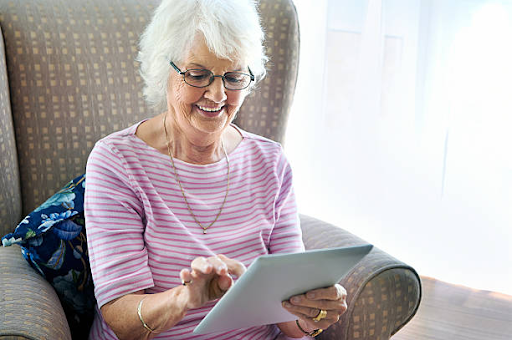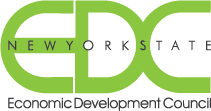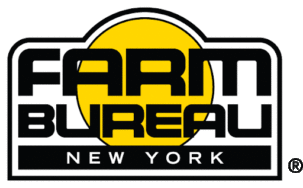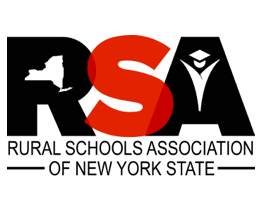NYSARH Newsletter
Winter 2022
Working to preserve and improve health and human services in rural New York State.
December 2021 - February 2022
In this Issue
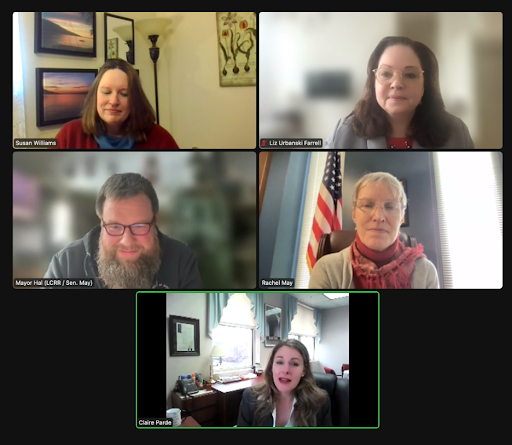
2022 NYS Advocacy
Governor Kathy Hochul emphasized health care in both her State of the State and Budget speeches and included increased funding in the Executive Budget for several NYSARH Policy Priorities.
Notably, funding for Rural Health Networks and Rural Access Hospital was NOT included. As of this writing, funding for AHECs was also omitted, but we are hopeful that this funding will be added in the 30-day amendments.
NYSARH hosted a members-only Policy Briefing on January 18th. We extend gratitude to panelists Scott Janke, HANYS; Glenn Leibman, MHANYS; Steven Kroll, NYSVARA; Christine Dyer-Drobnack, NYSACHO, and Marie Mongeon, CHCANYS. NYSARH developed our Policy Priorities after listening to their presentations and input from our members.
NYSARH has nine key points for the NYS 2022-23 fiscal year. They are:
- Fund RHN/RAH Development Programs
- Appoint members to the Rural Health Council
- Enhance resources for Rural EMS
- Repeal the 340B Pharmacy Carve-Out
- Adequately fund Public Health
- Support Mental & Behavioral Health
- Support Aging & Disability Services
- Expand Rural Broadband & Telehealth
- Promote Workforce Recruitment, Retention & Training
The NYSARH Policy Committee, led by Claire Parde, has been active on behalf of NYSARH. Several appointments with Committee Leaders have already occurred and additional appointments with legislators are scheduled in February. NYSARH encourages members to schedule local appointments with your own legislators. Please let us know and a member of the Policy Committee will be happy to join in.
Newsletter Content Survey
The NYSARH team kindly asks its readers to please take this 1-2 minute survey to help us improve our newsletter content.
2022 Public Health Partnership Conference
This year NYSARH is partnering with the NYS Public Health Association and others to bring you the 2022 Public Health Partnership Conference. The Public Health Partnership Conference will be held in-person this year with a virtual component available for those unable to travel. The event will be held in the city of Niagara Falls, NY April 27-29, 2022.
NYSARH members receive $50 off the cost of conference registration.
NYSARH and our Public Health Partnership Conference partners invite students to submit a proposal to present student work at the 2022 Public Health Partnership Conference “Public Health Equity: Building a Stronger New York.”
If…
- You are a student at a New York university or college
- You are passionate about public health
- You have an interesting paper, project, or research study to share that has not been previously presented.
Submissions must be received by March 11th at 11:59pm.
National Rural Health Association Emergency Preparedness Task Force
Starting in 2022 NRHA, in partnership with the State Association Council, will work to find ways to better prepare ourselves for emergencies. Emergencies can be described as anything from a natural disaster to pandemics. We have seen the recent impact of disasters that have faced our rural communities and the NRHA is taking a step to be better prepared. If you or anyone in your organization wishes to sit on the upcoming task force or has ideas on how to help broaden our emergency preparedness, please reach out to Zil at ZJDRomero@ruralhealth.us.

NYSARH Member Successes: Healthy Community Alliance Launches Caregiver Tech Solutions Program
By Ann Battaglia
CEO, Healthy Community Alliance and the CBO Consortium of Upstate NY
Healthy Community Alliance, along with aging and disability services partners in Cattaraugus and Wyoming counties, has launched a new respite program called Caregiver Tech Solutions. Amid the COVID-19 crisis and in response to rural caregiver needs, Caregiver Tech Solutions helps caregivers create opportunities for much-needed breaks from caregiving using digital technology. While respite has traditionally been a placed-based service, this program focuses on what caregivers can implement or modify within their homes using technology to be able to gain a sense of relief or respite while maintaining care for their loved one. This is important for rural caregivers who often do not have access to traditional place-based respite or secondary caregivers. Through individualized respite coaching and financial assistance for technology resources, Caregiver Tech Solutions re-imagines respite by customizing a technology solution to each caregiver’s unique and very personal caregiver journey.
One caregiver who enrolled in the program described how difficult it was for her to leave her mother at home each day while she went to work. She was continuously worried that her 93-year-old, home-bound mother was socially isolated, bored, and often in pain during the day. The caregiver was linked with an “e-respite coach” and together they explored needs and technology ideas to meet those needs. The tech solution was identified and the caregiver received a new iPad that was customized for use by her mother. The tablet was loaded with all her mother’s favorite word and card games, now all digitally available to her.
After one month of connecting the caregiver with the tech solution, the caregiver shared these comments:
Thank you for including us in the program. When I give my mother the iPad her face lights up. She loves playing on her “machine” as she calls it and now easily switches between her apps and games. She used to want to go to bed in the middle of the day and now she stays up until 10:00 and rarely complains about her pain. When I have to re-charge it she says, “You’re interrupting my fun!” It truly is amazing and such a relief to know she has some enjoyment during the day. I can’t wait to find new uses to help her feel less bored and alone.
Caregiver Tech Solutions is funded by the Exhale Family Caregivers Respite Pilot Program, a partnership between the Ralph C. Wilson, Jr. Foundation and the Health Foundation for Western & Central New York. For more information about Caregiver Tech Solutions visit www.caregivertechsolutions.org
Healthy Community Alliance, Inc., located in Gowanda, NY, is a Rural Health Network serving rural communities in Western New York. The mission of Healthy Community Alliance is to improve the quality of life in rural communities through broad-based, inclusive partnerships that support wellness and prevention. www.communityalliance.org
March is Colorectal Cancer Awareness Month
By Anne Marie Snell
Director, St. Lawrence County Health Initiative
The NYS Cancer Consortium’s Colorectal Cancer Action Team acknowledges March as Colorectal Cancer Awareness Month. Each year in New York State, approximately 9,000 people develop colorectal cancer, and 3,000 New Yorkers die from it. One out of every 24 adults will develop colorectal cancer sometime in their life. Colorectal cancer occurs most often as people age (60% of new cases occur among those age 65 and older), however, nearly 94% of all colorectal cancers are diagnosed after age 45.
Average Risk Colorectal Cancer Screening Starts at Age 45: Regular screening for colorectal cancer can save lives. For adults at average risk for colorectal cancer, the United States Preventive Services Task Force and the American Cancer Society now recommend that screening for colorectal cancer begin at age 45. The change to start average risk screening at age 45 comes as national and New York State data show that 9 out of 10 new colorectal cancer cases happen in adults aged 45 and older. There are a number of tests to screen for colorectal cancer. The three main tests—colonoscopy, the stool blood test (which also includes the fecal immunochemical test), and flexible sigmoidoscopy—are all effective at finding problems before they become cancer, or they can find cancer early.
The Importance of Recommending Screening: Colorectal cancer may not always cause symptoms, which is why screening for colorectal cancer is so important. A clinician’s recommendation for colorectal cancer screening is a significant motivator to a patient completing a cancer screening. In NYS, however, many adults report they are not getting this recommendation from their health care professional.

NYSARH Research on the Affordable Connectivity Program
Edad Mercier (MSc, LL.M.) is an Americorps member serving NYSARH since Fall 2021. She is interested in public health, environment, law, technology, and education. One of her research projects with NYSARH is telehealth access in rural communities under the new (2022) Affordable Connectivity Program (ACP). Some benefits of the ACP include a $30/month discount on internet service, a $75/month discount for qualifying households on Tribal lands, and a one-time discount of up to $100 for a laptop, tablet, or desktop computer.
Check out some of NYSARH’s resources on the ACP below and click here for more information about the program.
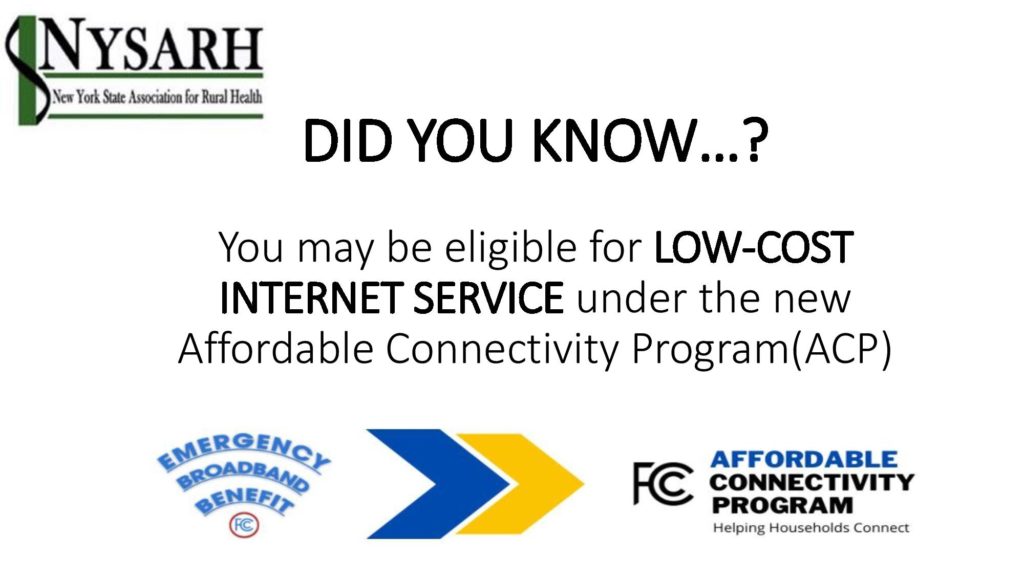
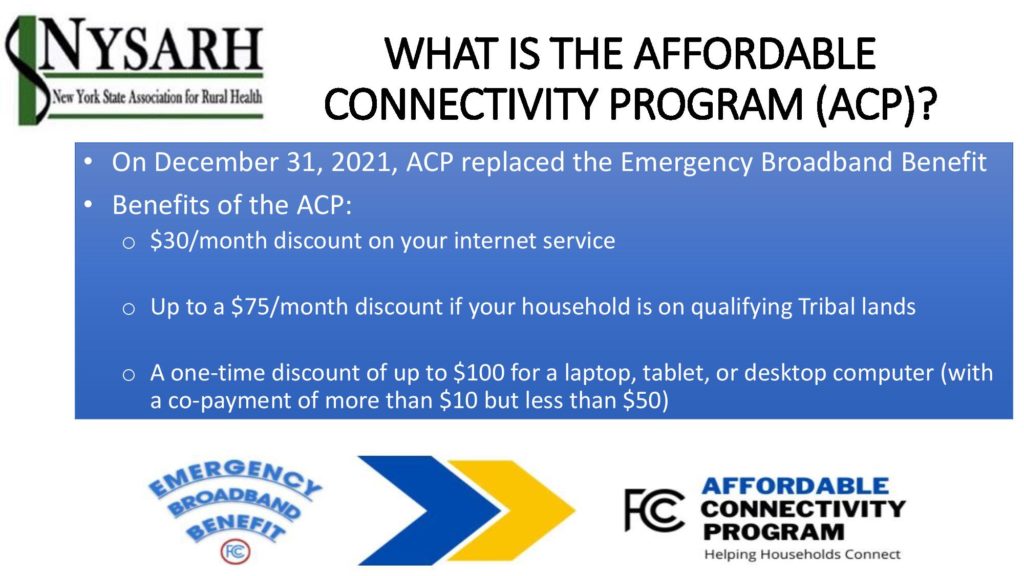
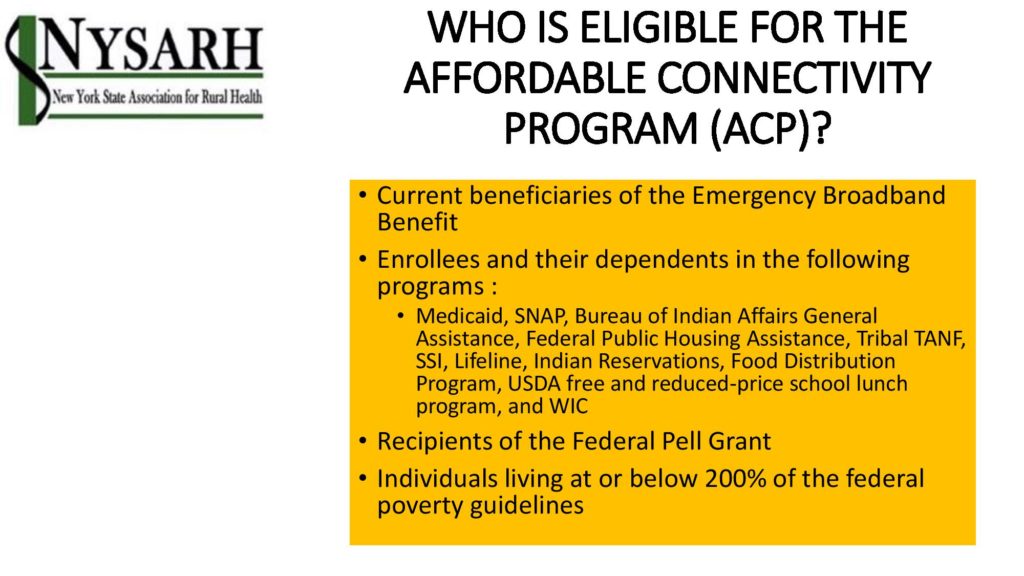
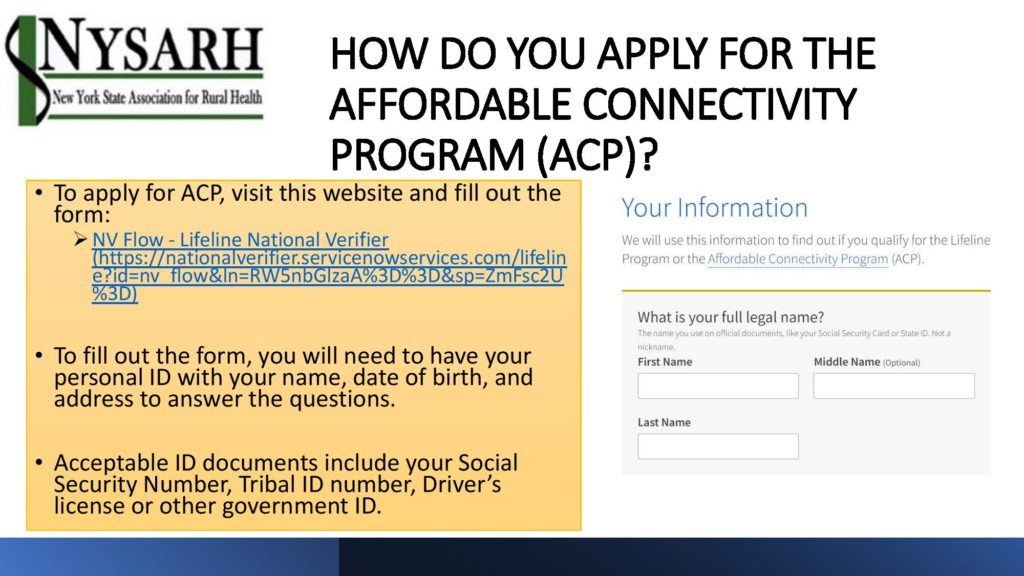
If you have any questions or would like more information about NYSARH and telehealth initiatives in rural communities, please contact edad@nysarh.org or sara@nysarh.org.

NRHA Rural Health Policy Institute
NYSARH was represented by Board President Helen Evans, Board Secretary, Alison Coates, who just completed her year as a Rural Health Fellow, Board Treasurer Ann Abdella, Policy Committee member Liz Urbanski-Farrell, AmeriCorps VISTA member Ella James and Sara Wall Bollinger at the 2022 Policy Institute. The event was virtual this year.
There were a wide variety of top Administration and Congressional speakers, well-orchestrated by Carrie Cochran-McClain, NRHA Chief Policy Officer. The speakers indicated a strong federal commitment to the expansion of broadband into more rural communities and support for telehealth flexibility. Many of the speakers noted that more resources are needed to enhance the healthcare workforce, both those currently working in rural healthcare and the young people we need to grow into the rural healthcare workforce of the future.
Dr. William Cooke shared a moving personal account of his work in rural Indiana, highlighting the intersection of social determinants of health, the opioid crisis and disparities in health outcomes. Rural life expectancy is declining.
Thursday afternoon featured the annual Rural Health Disparities Summit with a keynote from Dr. Marcella Nunez-Smith, Co-Chair of the White House COVID-19 Equity Task Force and a wrap-up from Dr. Cara James, President/CEO of Grantmakers in Health.
The virtual format made it more difficult to engage with other attendees, but NRHA arranged for some topic-oriented networking groups within the event app.
NYSARH’s Federal Policy Priorities and the supporting materials for Congress members are all available on our Policy Page. We encourage you to make an appointment with your Congress member to share this information.
2022 Rural Alliance Symposium
On February 2, 2022, the first Rural Alliance Symposium took place. This alliance was established in fall 2021 to strengthen the rural-focused advocacy efforts of the partner organizations. The organizations making up this alliance include NYSARH, the Rural Housing Coalition of New York, Rural Schools Association of New York State, New York State Economic Development Council, and New York Farm Bureau.
Along with the four other organizations of this alliance, NYSARH signed a letter that was sent to Governor Hochul asking for the reinstatement of a New York State Office of Rural Affairs. The Office of Rural Affairs would serve as Ombudsman for rural issues and act as a point of contact for rural communities in state government.
Beginning the event, Cornell University Professor, John W. Sipple and Ph.D. students Peter Fiduccia, Kate Foster, and Kristie LeBeau presented data on the state of rural New York to provide a background for the following speakers’ presentations. Their presentation covered data on the following topics: population change, education, housing, employment, internet access, and public health. NYSARH has made these presentation slides available on our news page found here.
Next, we heard from representatives of the alliance organizations. Director of Strategic Development, Sara Wall Bollinger presented at the event on behalf of NYSARH sharing the organization’s 2022 policy priorities. Michael Borges of the Rural Housing Coalition of NY followed, highlighting the difficulty rural housing projects have in attracting funding and private investment due to the smaller scale of these rural projects. Dave Little of the Rural Schools Association of NYS spoke next, touching on the inequitable distribution of education funding throughout the state.
The next speaker was Shelby Schneider of the NYS Economic Development Council. Shelby thanked Governor Hochul for including funding for rural town development through the Downtown Revitalization Initiative. Finally, Jeff Williams from the NY Farm Bureau highlighted the importance of supporting NY farmers as they navigate the effects of climate change and the development of solar energy in coordination with agricultural land needs.
Funding Opportunities
HRSA-22-063 Medicare Rural Hospital Flexibility Program- Emergency Medical Services Competing Supplement - Due March 4, 2022
The goal of this supplemental funding is to expand upon the current Flex program by encouraging rural EMS agencies to educate staff and leadership on the importance of accurate reporting, and how it drives quality improvement efforts at the agency level.
HRSA-22-092 Rural Health and Economic Development Analysis - Due March 8, 2022
The purpose of this program is to quantify and describe the economic impacts of local health care sectors on rural economies to provide information which will assist policymakers and other rural stakeholders to improve health care in rural areas.
HRSA-22-117 Rural Public Health Workforce Training Network Program - Due March 18, 2022
The purpose of this program is to expand public health capacity by supporting health care job development, training, and placement in rural and tribal communities.
HRSA-22-139 Teaching Health Center Graduate Medical Education Program - Due March 31, 2022
The purpose of the THCGME Program is to support the training of residents in primary care residency training programs in community-based ambulatory patient care centers.
Rural Microentrepreneur Assistance Program in New York - Due March 31, 2022
This program provides loans and grants to Microenterprise Development Organizations (MDOs) to help microenterprises startup and grow through a Rural Microloan Revolving Fund and to provide training and technical assistance to microloan borrowers and micro entrepreneurs.
Provider Relief Fund (PRF) - Reporting Period 2 Open Until March 31, 2022
The reporting portal is open for providers required to report on PRF payments during Reporting Period 2, and will remain open until March 31, 2022.
NIH Evaluating Pandemic-related Food/Housing Policies on Disparity Populations - Due April 7, 2022
The National Institutes of Health (NIH) will fund research to identify and evaluate policy and programmatic actions during the pandemic that address two specific social determinants of health: food/nutrition security and housing security.
Rural Innovation Stronger Economy (RISE) Grants - Due April 19th, 2022
The Rural Innovation Stronger Economy (RISE) Grant Program offers grant assistance to create and augment high-wage jobs, accelerate the formation of new businesses, support industry clusters and maximize the use of local productive assets in eligible low-income rural areas.
HRSA-22-061 Rural Communities Opioid Response Program – Behavioral Health Care Support - Due April 19th, 2022
The Rural Communities Opioid Response Program (RCORP) is a multi-year initiative by the Health Resources and Services Administration (HRSA) aimed at reducing the morbidity and mortality of substance use disorder (SUD), including opioid use disorder (OUD) in high-risk rural communities.
MEMBER LIST
We would like to thank each member who works diligently to make NYSARH the state’s strongest proponent for rural healthcare.
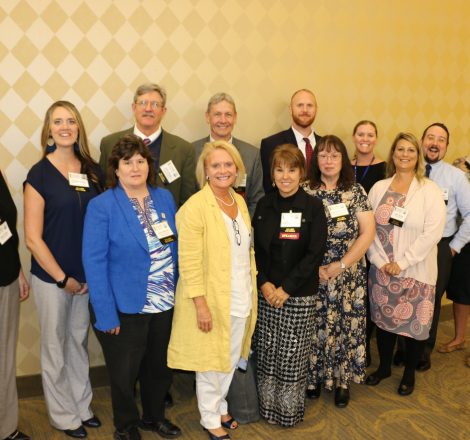
Organization-based Members
- Adirondack Health
- Adirondack Health Institute
- Ardent Solutions
- Brooks TLC Hospital System, Inc.
- Care Compass Network
- Cayuga County Community Health Network, Inc.
- Chenango Health Network, Inc.
- Common Ground Health
- Community Health Center of North Country
- Delaware Co Rural Healthcare Alliance
- Ellenville Regional Hospital
- Finger Lakes Community Health
- Finger Lakes IPA
- Fort Drum Regional Health Planning Organization
- Foundation for Community Health
- Genesee County Health Department
- Genesee Valley Health Partnership
- Healthy Community Alliance, Inc.
- Health Workforce New York
- Lake Plains Community Care Network
- M.S. Hall & Associates, LLC
- Madison County Rural Health Council, Inc.
- North Country Family Health Center, Inc.
- North Country Healthy Heart Network
- North Country Prenatal Perinatal Council, Inc.
- Oneida Health Foundation
- Opportunities for Otsego, Inc.
- Prevention Network
- Rural Health Education Network of Schoharie, Ostego, and Montgomery Counties
- Rural Health Network of South Central New York
- Rural Outreach Center
- S2AY Rural Health Network
- Seven Valleys Health Coalition
- Southern Tier Health Care System, Inc.
- Steuben County Rural Health Network
- St. Lawrence County Health Initiative, Inc.
- Sullivan County Public Health Services
- SUNY Upstate Medical University College of Nursing
- The Chautauqua Center
- The Healthcare Consortium
- The Resource Center
- Universal Primary Care
- Upper Hudson Planned Parenthood
- Upstate Family Health Center, Inc.
- UR/St. James Hospital
- Wyoming County Community Health System
Individual Members
- Ann Abdella
- Diane Albrecht
- Angela Bashaw
- Amy Carman
- Leanna Cleveland
- Alison Coates
- Anthony D’Agostino
- Marela Fiacco
- Lisa Gugerty
- Steven Kroll
- Karin Pantel
- Mandy Qualls
- Nicole Rouhana
- Carrie Roseamelia
- Susan Salahshor
- John Salo
- Raj Sam
- Ann Sedore
- Jennifer Seymour
- Courtney Shaler
- Janice Shirley
- Kristen Stiegler
- Elizabeth Urbanski Farrell
- David Yens
Student Members
- Jennifer Bliss
- Susan Cagir
- Emilee Conner
- Stacie Corrigan
- Tammy Ellinger
- Theekshana Fernando
- Grace Gugerty
- Ella James
- Adrienne Lamb
- Audreanne Mills
- Bridget Oppong-Darko
- Frances Oquendo
- Ruthanne Parsons
- Elana Sitnik
- Madaline Toliver
- Ayden Weimann
Become a Member
We invite you to join us through advocacy and by advancing initiatives that support a commitment to improving healthcare quality and access.
